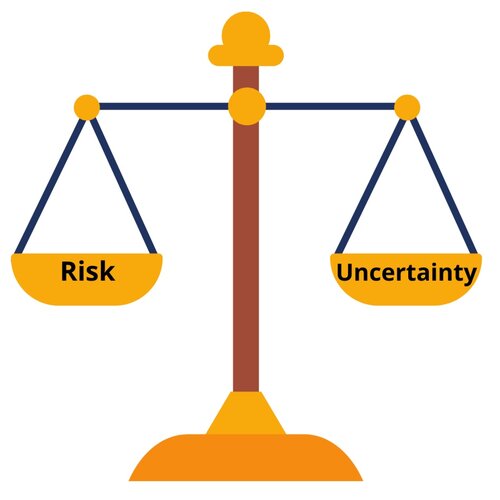Being an entrepreneur during an economic recession doesn’t automatically mean your business is doomed to fail. What determines the future of your business is how you deal with the shifted balance of Risk and Uncertainty during that recession.
Risk describes a situation where you have an idea about what will happen next and how that outcome will affect your business. That’s why you can measure risk before you take it.
Uncertainty, on the other hand, cannot be measured because the possible outcomes are unclear and difficult to predict. It’s comparable to walking through a lake of murky water where you can’t see what’s around your feet.

Owning a business means you’ll always hold Risk and Uncertainty on a balancing scale.
It is a world of change in which we live and a world of uncertainty. We live only by knowing something about the future; while the problems of life, or of conduct at least, arise from the fact that we know so little. This is as true of business as of other spheres of activity. – Frank Knight
During an economic recession, the balancing scale tips and puts a lot more weight onto the side of Uncertainty. That’s why some entrepreneurs don’t care how many biscuits they can get for their Risks because their level of Uncertainty is just too great.
THE AMPLIFIED FEELING OF UNCERTAINTY DURING A RECESSION
Some entrepreneurs stop taking risks and wait out the storm. They cut budgets that seem unnecessary so they can divide funds into more demanding departments. Others decide to take on the storm and find ways to keep growing their business in uncertain times.
A popular example of these two strategies is from 1920 when Kellogg’s was trying to compete with Post in the breakfast cereal market. When the Great Depression hit, Post Corporation cut costs and focused its money and energy on mergers and acquisitions.
Kellogg’s created a whole new product, Rice Krispies, and invested money to market their “Snap, Crackle, Pop” slogan. Kellogg’s profits grew substantially and became a market leader in cereal.
Both strategies can keep your business alive, but it’s up for debate whether they both keep you successful and on top of your game. It’s hard to think that a recession is a time to take risks, but with the opportunity to grow while another business’s shy away, can you really afford not to?
“I have yet to see any study that proves timidity is the route to success. Studies consistently have proven that companies that have the intelligence and guts to maintain or increase their overall marketing and advertising efforts in times of business downturns will get the edge on their timid competitors.”– Senior VP, J. Welsey Rosberg Meldrum & Fewsmith
How do you set up your business correctly so the risks you take are fitting for the economic times you’re in? Here’s a guide on how you aim your marketing efforts so you’re hitting targets even though they’re saturated in recession tension.
DON’T STOP MARKETING
Take those scissors off your marketing budget. You want to have the financial wiggle room to promote products, advertise, and conduct market research so your business can properly transition into the temporary state of the world. Cutting those corners might cost you customers that are worried about the world but are still willing to spend a little money.
ACQUAINT YOURSELF WITH THE NEW VERSIONS OF YOUR CUSTOMERS
You might think you already know your target audience but economic uncertainty brings out a whole new buying personality in the customers you’ve come to know and love. This is another good reason why you should keep your marketing budget. It allows you to do things like User/Market Research.

For example, Beth, who used to come into your coffee shop every day for a mocha frap with extra caramel and a muffin, now only stops by maybe once a week. And Bill, who has always called your home repair business for his random strokes of bad luck, now puts on his Bob The Builder hat when his roof starts leaking.
The winds of change can be costly if you don’t know in what direction your customers are moving. Get to know your new customers so you can fit their new needs.
POSITION YOUR BUSINESS TO BE A STABLE PRESENCE IN A SEA OF UNEASY CUSTOMERS
Once you know your customer’s new buying personality, position your business so you fit their needs and be a comforting presence in a time of uncertainty. This might be as easy as offering a special discount or as hard as offering an entirely new service.
Let’s go back to Beth and Bill.
Make sure Beth a punch card that provides her with the incentive to keep coming back for an eventual discount. This gives her a free drink but also tells her you will still be open after ten drinks. For the Bills of the world, you could start a Youtube channel, guiding homeowners through simple home repair. You’ll stay in your customer’s minds and maintain your authority. Both are helpful when Bill finds out that fixing a leaky roof is not simple home repair.
SHOW SOME EMPATHY
Show your customers that you’re all in this together. This is a fitting opportunity for you to reach out to your customers to get personal and make lasting connections. You can amplify your brand and your message by showing up in your community while you represent your business and its values.
GET ADVICE FROM A PROFESSIONAL MARKETER
With the pressures of keeping your business afloat, you might overthink creative ways for your products and services to show up for your customers. A professional can help you shift your message and reposition your services so you can appear strong and consistent when your customers need it most.
A professional can also help you reposition your services and products so you can tap into a new pool of customers. Always striving to achieve new customers is how your business will improve and grow past your expectations.
THE SKINNY
You started a business because you have confidence in your ideas and ability to help fill a need. Don’t lose the wind in your sails in fear of failure. Batten down the hatches, if you can, and show up for your customers so a recession does not define your business success.





